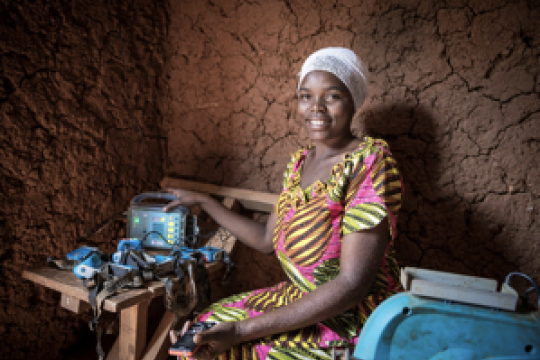Women entrepreneurs in rural Rwanda, who are making a living through selling solar PV rechargeable light systems as well as offering recharging facilities for lights and mobile phones in their communities, are proving to be more successful in their business ventures than their male counterparts. This challenges a prevailing myth that women entrepreneurs aren’t as likely to succeed as men.
Comparing the sales figures of over 1000 small rural enterprises in this East African country, researchers have found that women running solo businesses in this sector outcompete men by 36 per cent. When similar businesses are run by teams that are women-led, they also do better than their male-led competitors.
These women’s business success also shows that they get greater benefit from their entrepreneurialism, beyond just the income they earn from the sale of their products.
According to a team of economists, some of whom are based at the Environmental Policy Research Unit in the School of Economics at the University of Cape Town in South Africa, women in these businesses say they have more time to devote to other household responsibilities. They also report greater self-confidence, a sense of having better standing within their communities, and more agency in their lives.
When their male business counterparts were asked about the overall benefits of running these small business, the men did not report the same kinds of social and personal ‘returns’.
According to the researchers, entrepreneurs operating in villages in rural Rwanda who are selling rechargeable lights provided by a for-profit social enterprise business Nuru Energy. The business model allows village-level entrepreneurs to retail Nuru’s LED lights at a small profit margin, as well as offer solar PV recharging facilities for these lights as well as for mobile phones.
The economists compared the business performance of men and women running these businesses, and then interviewed the women to get additional information on how they perceived their lives to have benefited from the business ventures.
Comparing sales figures, their analysis shows that women single-operator businesses outcompete the male single-operator businesses on the sale of LED lighting units by 36 per cent. Where sales are handled by a team, if the group is led by a woman, it outcompetes male-headed teams by 60 per cent.
‘Apples-with-apples’ comparison
Women are estimated to run about a third of all business worldwide, says the team, whose findings were published in the IDS Bulletin on Gender and Energy in February 2020. However, women entrepreneurs tend to operate in specific sectors, such as the textiles and fashion industries, hospitality and food, and education and health services.
‘These are industries that have relatively low barriers to entry, but also have high levels of competition and low profit margins,’ say the authors in their paper.
Because men dominate in other the business sectors, this often makes an apples-with-applies comparison of performance along gender lines in business difficult. By zeroing in on the Rwanda renewable energy micro-business initiative, this gave researchers a better way to compare gender performance within a sector.
When women run their own show
Supporting women in small scale business like this can have wide social benefits, previous research has shown. When women are in control of the household budget, they tend to spend more on food and essentials such as clothing or health expenses. Meanwhile, men tend to spend money on recreation or savings.
Women also prefer to run their own businesses, over having formal employment, because it allows them to work close to home where they can ‘double task’ on family duties while also earning an income.
When researchers spoke with some of the women involved in selling the Nuru lighting systems, they reported feeling greater confidence in themselves, a greater sense of community involvement and belonging, and having more control over their lives. They also reported having more time to complete their daily household chores, which they could now also do after-hours, since they had lighting at home.
‘Overall, these findings suggest that women entrepreneurs make excellent sales agents in the solar energy sector in Rwanda,’ say the team, ’however our findings also suggest that recruiting programmes for women may receive some pushback from the village patriarchy.’
This means there may be a need for ‘strategic management of stakeholder relationships’ when dealing with a village’s leadership when rolling out these sorts of social entrepreneurial initiatives.
The research was conducted by EPRU affiliates Dr Manuel Barron from the Department of Economics at the University of the Pacific in Peru, with Prof Martine Visser, Rebecca Klege, and Rowan Clarke at the University of Cape Town. Amanda Elam from the Center for Women’s Entrepreneurial Leadership, Babson College and Anita Shankar from the Bloomberg School of Public Health at Johns Hopkins University in the US also contributed.
The work was funded by ENERGIA.
